- Home
- Douglas E. Richards
Oracle Page 2
Oracle Read online
Page 2
“Hello, Shane,” began the drug kingpin. “Glad you called. Showtime is just a few hours away.”
They had only encountered one possible speed bump that could slow the launch of Foria even a little, an LA detective a little too clever for her own good. Marshall had insisted that he could take care of her. And he had really outdone himself this time, coming up with a plan that he considered a masterpiece. Sure, it would end up costing him a man—maybe two or three if something went wrong—but the expense of the operation would be borne entirely by Shane Frey.
Marshall would gladly sacrifice a few expendable members of his organization to get the job done—especially if it didn’t cost him financially. After all, his willingness to sacrifice even those most loyal to him like pawns in a chess game was what had allowed him to rise to the top in LA in the first place. And during the past few years, with this as home base, he had gradually expanded his empire in all directions, and was confident that before too long, he would become the dominant drug lord in all of California. With Frey’s new product, this would likely only be the beginning.
“You’re positive your plan will work?” said the deep, somehow unsettling voice of Shane Frey.
“Positive,” replied Marshall, for what must have been the third or fourth time. “The bitch won’t know what hit her. She’ll never cause any more trouble again, or raise any more red flags. She has a dinner reservation tonight at six at the Dock Harbor Bistro in Santa Monica, where she’s meeting a professor. The restaurant is at least a thirty-minute drive for her, so we should have two hours to operate, at minimum. We’ll only need one. And I’ll have a man watching the restaurant’s exit to be sure she doesn’t leave early. Should go like clockwork.”
“Don’t underestimate her,” said Frey. “She’s shown herself to be as shrewd as they come. And she lives in a pricey condo with pricey security.”
“Don’t worry,” said Marshall. “I’ve brought in the best talent money can buy. I hired a specialist from Houston who knows her alarm system like the back of his hand. He can beat it in fifteen minutes. And I’ve brought in out-of-town computer experts as well, along with out-of-town muscle.” He paused. “It takes a village,” he added with a smile.
“Just be careful,” said Frey, “and thorough. Now that Detective Abbott is on her way home, I’ll initiate my part of poisoning the well. Just see to it that you complete yours.”
“Don’t worry, Shane. We’ll be in and out, clean and efficient. No one will ever know we were there. We’ll leave everything the way we found it, and clean up after ourselves.”
“And then you’ll lure her to her death soon after she returns from dinner?”
“Exactly,” said Marshall. “And we’ll have multiple redundancies, and backups for our backups, just to be certain.”
Not that these precautions would be necessary. He had every confidence that Jimmy Jessup would be able to lure her to the kill zone they had set up. And just for the sake of good theater, Jimmy would be shot and killed as well, with her gun. Although Jimmy hadn’t been briefed on this part of the plan. Then they would plant a bag filled with twenty grand worth of Benjamins on her corpse, along with instructions for what they wanted from her in return.
Just like that, it would be the beginning of the end, wrapped up in a neat little bow.
Marshall hated to lose Jimmy, but sometimes sacrifices needed to be made.
And Marshall was just the kind of man willing to make them.
2
Detective Anna Abbott arrived early at the Dock Harbor Bistro and watched the sun inch its way down toward the edge of the ocean, a journey that would be completed in an hour or so when this dazzling yellow orb dropped quickly below the horizon and vanished.
Anna had no idea what she was doing here, as her case load was more demanding than ever. And if she couldn’t take time out to even date, what was she doing dining with a total stranger?
On the other hand, she did deserve a break now and then. And since this wasn’t a date, why not dine with a man in a fancy restaurant without having to worry if they were connecting, if he wanted to sleep with her, and if she wanted to let him? Besides, her instincts had told her to say yes to the invitation, and she rarely went against her gut.
After five minutes of gazing at the spectacular sun, wispy clouds, and ocean, she turned to study her dinner companion for the evening as the hostess ushered him to her table. It was exactly six. He was punctual, she had to give him that.
She didn’t feel like she was getting much of a read on him, although her instincts told her he wasn’t a threat. Not that she had expected him to be, but when meeting a stranger, there was always the possibility that alarm bells might go off. Still, there was something a little off about him, which she couldn’t quite put her finger on.
He had androgynous features and was baby-faced, with flawless skin that she suspected only needed shaving once a week, as even facial hair was reluctant to taint its smoothness. He was of average height and slender, with soulful brown eyes that were larger than average.
She rose to greet him.
“Detective Abbott,” he began, shaking her hand, “it’s truly an honor.”
“Professor Vega,” she said as they both sat. “Welcome.” She gestured through the panoramic window to the ocean beyond. “Nice place you’ve chosen.”
He smiled. “I’m glad you approve. And please, Detective, call me Tom.”
“If you’ll agree to call me Anna.”
Professor Thomas Vega nodded. “Anna it is.” He locked his eyes on her as if she were the only woman who had ever lived. “I can’t thank you enough for agreeing to meet with me,” he added.
She was still having trouble gauging him, but perhaps this was because he was so awkward in her presence, like a gushing fanboy basking in the presence of a hero.
“So you’d like to write a scholarly paper about me,” she said. “Normally, I’d spend more time on small talk and ease into the main conversation. But this isn’t a date—and I can’t help but be intrigued.”
“And I hope flattered.”
Anna allowed herself a shallow smile. Vega had contacted her several days earlier and had all but pleaded to meet with her, and she was pretty sure he would have walked barefoot over a sea of broken glass to do so. He was a professor of criminology at Stanford, and although she offered to speak with him and tell him anything he wanted over the phone, he wouldn’t hear of it. He insisted that it was the shortest of flights to LA, and he would like nothing more than to buy her a dinner at an upscale beachfront restaurant. After she had briefly surfed the web to verify his credentials and satisfy herself that he was who he claimed to be, she had agreed.
“So how do you know that I even exist?” she asked him bluntly.
Vega smiled. “You’re the detective with the highest solve rate in LA,” he replied simply. “What criminology professor wouldn’t want to meet with you?”
“Random chance,” she said dismissively. “Someone has to have the highest solve rate in LA. I’ve just had a lot of lucky breaks.”
The professor shook his head. “Each city compares and ranks all detectives within its jurisdiction who have handled at least twenty felony cases,” he said, “based on their solve rate percentages. But these are never combined into a statewide report. Even so, it’s easy enough to do this by hand if you’re so inclined. I don’t suppose that you’ve ever gone to the trouble.”
Anna shook her head.
“Would it surprise you to know that you have the highest solve rate, not just in LA, but in all of California?”
“Not really,” she said pleasantly. “And sorry if I sound immodest.”
“Not at all,” replied Vega. “Because I’m not done. Turns out you have the highest solve rate of any detective in all of America.”
She allowed herself a brief smile. “Nice to know,” she said, not seeming to be particularly impressed with herself. “So you’ve found what you think of as the most successful detecti
ve in the country, and you want to write a scholarly article on what makes me tick.” She had guessed this from the start, but didn’t want to get too far ahead of herself.
“Exactly,” said the professor. “I’ve been studying you thoroughly for weeks now. Your success isn’t because of luck. And it’s not because you’re only assigned open-and-shut cases. In fact, just the opposite. For some time now, it’s clear to me that your captain is only assigning you the hardest cases. Often after others have come up empty.”
Anna Abbott didn’t reply.
“You’re also the youngest detective in California. And you’d have made captain by now if you actually wanted the job, or if you cared about politics. Although something tells me that if you cared, and political maneuvering was important, you’d be great at that, also.”
The waiter came by, took their orders, and left.
“So you want me to share my secrets,” she said.
“Yes, but only for an obscure journal. It’s not like I’m with the New York Times.”
“What makes you think I’d care if you were?”
“I’ve noticed you’ve mostly shied away from the spotlight.”
“You’ve done your homework well,” she allowed.
“Thank you. The good news for you is that my scholarly piece will be in a journal with extremely limited circulation. It will help nerdy criminologists teach future detectives to be better at their jobs, but that’s about all.”
“And can you write it without providing my name or precinct? Or even what state I’m in?”
Tom Vega nodded. “I thought you might want anonymity,” he said. “Yes, absolutely.”
She smiled. “Good. Then I’m in.”
“Outstanding!” said Vega as the waiter brought a glass of red wine and placed it before Anna. The professor had elected to stick with water. “So what made you decide to become a detective?” he asked her, wasting no time beginning his interview.
“I thought you wanted to know how I solve cases,” she said.
“I do, but I wanted a little background for my own sake. I won’t put it in the article.”
Anna preferred not to say, but her instincts continued to insist that she be open with him. She took a deep breath, and a sad expression came over her face. “My parents were both murdered when I was seven,” she answered grimly. “I’d rather not go into any details,” she added, “but suffice it to say that Batman and I had the same motivations for becoming crime fighters.”
Vega blinked in confusion.
“Really?” she said. “You know, Bruce Wayne’s parents were murdered when he was a kid, which is why he went on to become the Caped Crusader.”
“Right,” said Vega. “So you’ve wanted to be a detective since then?”
“Of course not,” said Anna. “Not until much later. No seven-year-old kid makes that kind of decision. But this incident was ultimately the prime driver.” She paused. “But enough about my past. Let’s talk about my present. Let me tell you why I think my success rate is so high.”
The professor stared at her with such rapt attention that she had the feeling the restaurant could burn down around them and he’d be completely oblivious. “I’m all ears,” he said. “And, please, don’t hold anything back. Take all the time you need. Err on the side of being too thorough.”
Anna sighed. “If you insist,” she replied. “But once you’ve heard me out, you’ll be changing your mind about writing an article. And no journal will accept it anyway. Because it turns out that the crime-solving insights I’ll be sharing aren’t exactly mainstream.”
Vega smiled. “Good,” he replied. “They wouldn’t be of any value to me if they were.”
3
Tiparax Orr sat in the driver’s seat of an SUV, resenting the presence of a low-ranked comrade named Fanimore sitting beside him, and focused his attention on a floor-to-ceiling window off in the distance. Two other of his comrades were sitting inside a four-door sedan nearby, assisting in a mission that had been nothing but a waste of time.
Until now.
Until, from out of nowhere, it had suddenly become more interesting than any of them could have possibly predicted.
This, at least, was a small mercy.
Still, Tiparax fumed. He despised Earth. Despised everything about it. He loathed its sun and its sky. He loathed the throngs of human beings that littered cities like this one. He loathed their feeble minds, backward technology, and irritating, singsongy languages, which hurt his throat to speak.
But mostly he hated the planet’s lack of light. In an hour or so Earth’s single sun would set, plunging this part of the planet into darkness, which the inhabitants’ pathetic artificial lighting wouldn’t come close to fully alleviating. Even during periods of the brightest sunlight, the planet was never bright enough.
He and his colleagues had light amplification technology surgically implanted into their eyes, the same tech their predecessors had used thousands of years earlier, which could magnify ambient light as much as tenfold. But their scientists had never gone to the trouble of eliminating an unfortunate design flaw. When the implants were in use, they turned pupils a gleaming, fiery red, and the whites of eyes into the color of human blood.
Which meant that Tiparax and his colleagues couldn’t activate them in proximity to any human. His kind were already physically taller and more imposing than the vast majority of natives, with more severe facial features. Add in gleaming red eyes, and even members of this clueless species might begin to take notice.
“Hold your positions,” he ordered his two colleagues in the other sedan through a comm implanted in his throat, using a language that was so guttural in some cases, and so piercing in tone in others, that it could literally hurt the ears of the natives. He and his brethren now on the planet all possessed comms in their throats and ears that could be activated using thoughts alone, and which could measure and interpret subvocal speech, making communication silent, when necessary, and all but telepathic.
“I’m calling in a report now,” added Tiparax. “I’ll conference you in.”
Without waiting for a response, he sent a feeler to their commander, Shanifrey Doe, requesting an audio connection. While they had to pass as human, their interaction with the natives was minimal. Shanifrey, on the other hand, as the head of their entire contingent on Earth, had taken on the more demanding job of masquerading as one of them for extended periods. He called himself Shane Frey, which was conveniently close to his actual name, although annoyingly mellifluous when spoken by a human.
“Tiparax here,” he said subvocally when Shanifrey opened a channel. “Fanimore is in the car with me, and I’ve conferenced in Eldamir and Mezzitorp as well.”
“You know how busy I am tonight!” snapped the alien leader. “This had better be important.”
“It is,” said Tiparax calmly. “Since our quarry appeared on the radar two days ago, he hasn’t done anything noteworthy. Not really. But that changed in a major way just a few minutes ago. You’re really going to want to hear this.”
“Are you going to tell me!” snapped Shanifrey, “or do I have to guess?”
“He’s having dinner with your favorite detective. Right this second. The one who’s becoming a thorn in your side.”
“Anna Abbott?” said the commander in disbelief.
“Correct.”
“Impossible,” said Shanifrey.
“That’s what I thought. They have nothing to do with each other. It’s hard to imagine they’d intersect if they both lived a thousand lifetimes. So I made absolutely certain it was really her. I triple-checked her image against the ones you supplied earlier, using the best facial recognition programs these humans have, and there isn’t a smidgen of a doubt. I don’t know what to tell you. The odds of these two even bumping into each other—by accident—are millions to one against. I can’t even begin to calculate the odds against them actually having dinner together.”
Shanifrey paused for several long second
s. “Or maybe it’s just the opposite,” he said thoughtfully. “Maybe it isn’t random at all. Maybe it answers questions about this detective that we weren’t even asking. I should have seen it before. Of course that’s why he’s in LA.”
As Shanifrey’s three underlings considered his words, they immediately reached the same conclusion he had, and apologized for missing the obvious.
“It’s a good thing I didn’t let you grab him when you wanted to,” said their commander. “If we had tortured him to death, we’d have obtained information, but it might have been unreliable and incomplete. But notice where he leads us when he doesn’t know we’re following.”
“Well done,” said Tiparax, giving his commander the praise he was so clearly fishing for. Shanifrey’s chest-thumping was par for the course, and his second-in-command wasn’t about to deny him the response he was after. “So what are your orders?” he asked.
There was a long pause. “This detective is slated to die tonight anyway,” said the commander finally. “And since she has no information we need, there’s no reason to change the plans I’ve made for her. So, assuming they part ways once the dinner is over, ignore her. Continue to stay on him as before. See who else, or what else, he might lead us to.”
“Understood,” said Tiparax, trying to hide his disgust. This babysitting duty was beneath them. There were any number of ways to have their quarry tracked remotely. But Shanifrey wouldn’t hear of it. He felt it was critical that the tracking be done in person, so his men were right there to intervene at a moment’s notice, depending on how events unfolded. Given what had happened, Tiparax had to concede that the boss might have made the right call after all.
Still, he didn’t have to like it.
“And if they leave together?” asked Tiparax.
“That might not be ideal. While I find it very hard to believe we’d have anything to worry about if they did join forces, why take any chances? If they do leave together, capture them both.”
“I get why we’d want to capture him. For interrogation. But why keep the detective alive? You just said that she’s slated to die tonight anyway.”

 Oracle
Oracle![[2016] Infinity Born Read online](http://i1.bookreadfree.com/i/03/18/2016_infinity_born_preview.jpg) [2016] Infinity Born
[2016] Infinity Born Infinity Born
Infinity Born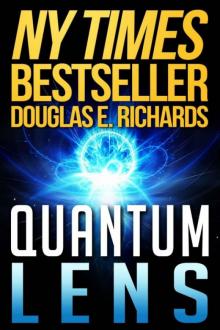 Quantum Lens
Quantum Lens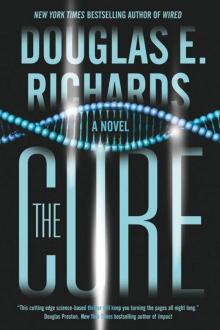 The Cure
The Cure The Immortality Code
The Immortality Code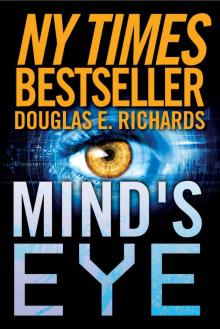 Mind's Eye
Mind's Eye MindWar (Nick Hall Book 3)
MindWar (Nick Hall Book 3)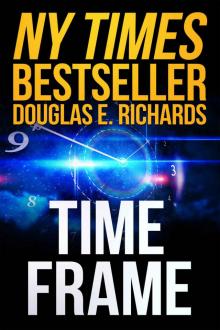 Time Frame (Split Second Book 2)
Time Frame (Split Second Book 2)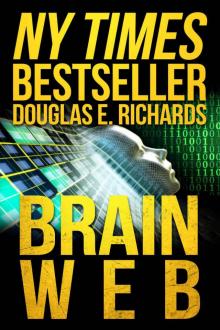 BrainWeb
BrainWeb Wired
Wired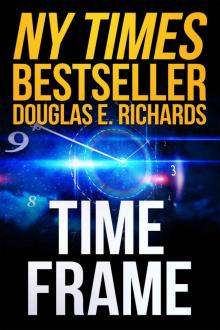 Time Frame
Time Frame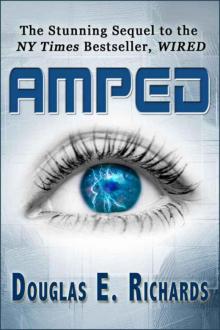 AMPED
AMPED Out of This World
Out of This World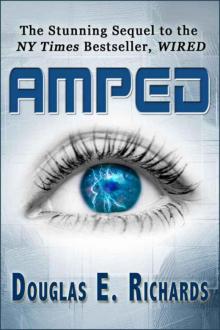 AMPED w-2
AMPED w-2